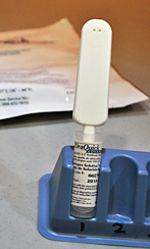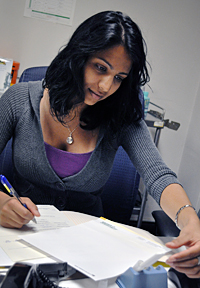

HEARTy HIV Outreach
HEART Pumps Up HIV Awareness in the Bronx
Recent media coverage of HIV suggests the fear once surrounding the virus that causes AIDS has ended. Even so, students at Einstein are making sure that the conversation concerning HIV awareness continues–especially in the Bronx.

Student leaders of Einstein's HEART group, Laura Hawks and Jo Henderson-FrostWith the prevalence of HIV/AIDS in the borough well above the national average, at 1.73 to 2.9 percent in high-risk neighborhoods, Einstein students created a group, HIV Education and Rapid Testing (HEART), to improve awareness of HIV prevention.
HEART partners with the Adolescent AIDS Program (AAP) at Einstein's University Hospital and academic center, Montefiore Medical Center, to provide free, rapid HIV testing each week at Bronx Community College and Lehman College. The group also offers HIV education to high school students.
"In the U.S., 35 percent of new HIV infections are among youth, ages 13 to 29,"explained Jo Henderson-Frost, a second-year Einstein medical student who is HEART's project director. "Reaching this population is a top priority."
She added, "Even though the disease is no longer the death sentence it once was, there's still stigma associated with HIV testing, so we attempt to demystify the process and make testing part of a normal routine."
That has been HEART's goal since its creation in 2010, when Dr. Donna Futterman, director of AAP, spoke to Einstein's global health club about her efforts to increase HIV testing in South Africa and the similar issues she has observed with her Bronx patients.
"There was a real need to address existing misconceptions and Einstein students met the challenge," she said.
During the past spring semester, HEART members tested 275 college students and reached even more high school students via a relatively new educational component.
"It's especially important to reach high school students, since most are unsure about where they can get a confidential HIV test and may not want others to know they are sexually active or potentially positive," said Ms. Henderson-Frost.
Training and Guidance

An HIV testing kitThe medical students involved in HEART receive training from the AAP staff in HIV testing, peer education, sexual history taking, and sexual health counseling, as well as point-of-care certification from Montefiore. AAP also provides test kits, supervision and additional counseling, as needed.
Justin Toro, outreach coordinator at AAP, has supervised the latest group of about 50 Einstein students. He sees both immediate and future opportunities to advance HIV awareness through HEART.
"AAP is training medical students to be comfortable asking the right questions and administering the test. They represent future doctors who will understand the significance of HIV testing," he said. "It makes our job easier as we continue to educate our communities."
The training also serves as a unique way to improve the students' medical skills.
"Not too many first-year medical students get the opportunities we do through HEART, to get out in the community and do something tangible," said Tim Day, a second-year medical student and HEART's director of operations. "After talking with teens and young adults about sex, taking a sexual history during our clinical medicine course is that much easier."
Making Connections
But it's the community that benefits the most. "Through our counseling efforts and sex education classes at schools, we're helping adolescents to be more comfortable about discussing uncomfortable topics," said Laura Hawks, a second-year medical student and HEART's community outreach director.
According to Ms. Hawks, after getting past any initial uneasiness, a healthy dialogue is established. Those who get tested are empowered by learning their HIV status, and everyone gains useful information about disease prevention. This is especially true for young women.
"When we work with young women, they often mention the power imbalances in their sexual relationships," she explained. "We help them to understand that they have the right to insist that their partner use a condom and offer suggestions on how they can do this. All women should feel in control of their sex lives, and our goal is to help them find ways to make that a reality."

Einstein student, Priya Patel, reads a test resultThe subject is just as important for men. Mr. Day recalled an experience dealing with a bisexual youth who had never been tested. "Young men who have sex with men are at the highest risk of getting HIV," he said. "This student even had a family member who is HIV-positive and still shied away from taking the test."
Mr. Day counseled the youth, discussing the importance of regular testing and answering his questions. "This was someone who should be getting tested regularly, so it was a very rewarding experience to walk him through his first test," he continued. "When it came back negative, he was so relieved. It was a powerful moment."
For individuals who are sexually active or at high-risk for getting HIV, such as those who have multiple partners or do not use protection, the next step is to encourage them to be tested at least every three months, and less frequently for those not at high risk.
"It's hard to say that in one interaction, you can change someone's life," said Ms. Hawks. "Our hope is that our message, along with other information out there, will help young people realize they have power over their lives."
Getting Results
From Dr. Futterman's perspective, the HEART team is doing a great job keeping the conversation alive.
"Our students have always had that drive and passion to make a difference," said the Einstein alumna. "They are committed to taking HEART to new places. I am impressed and proud of their work."
But the HEART students feel there's more they can do. The group plans to expand its high school efforts to include testing. They also plan to visit homeless shelters and juvenile detention centers in the Bronx.
"While ultimately we were fortunate not to have any positive test results this entire semester, we still need to make sure we reach the populations that are at greatest risk for contracting HIV," said Mr. Day.
With each new group HEART reaches, it is Dr. Futterman's hope that "the next generation can be the HIV-free generation."
Editor's Note: In accordance with a new state law, Montefiore Medical Center could make Dr. Futterman's hope a reality–by assuring that all of its adult and adolescent patients are offered HIV testing on site. This latest initiative, now in place throughout all Montefiore hospital divisions and clinics, continues a 30-year legacy of making contributions to fight the virus and to provide optimum care and counseling for those whose HIV status may prove to be positive.
Posted on: Thursday, August 23, 2012


